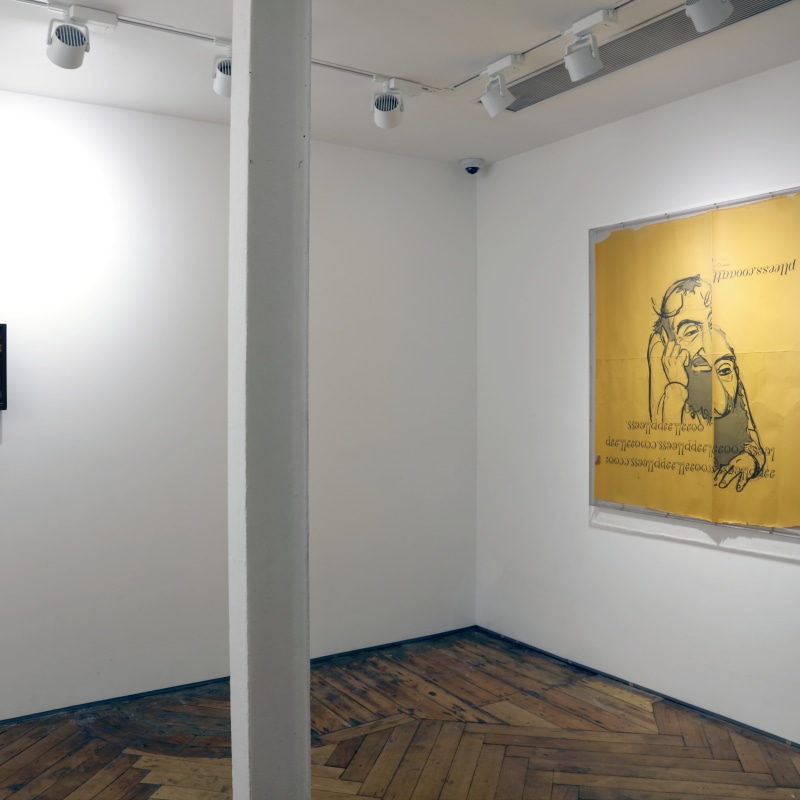To coincide with Frieze 2018, Sadie Coles HQ is presenting two works by Jordan Wolfson in the gallery’s Shop space at 62 Kingly Street. Wolfson’s early video The Crisis (2004) is installed alongside a print from 2010-11. Each work deals in a distinct way with the idea of self-image – a candid self-portrait sits next to a more oblique examination of the masks which constitute ‘identity’.
In The Crisis, a video made by the artist when he was in his mid-twenties, we see Wolfson wandering through a medieval cathedral with a backpack, delivering his thoughts to the camera in the style of a tourist recording a video diary. Apparently impervious to the building around him, Wolfson meditates on the idea of greatness in contemporary art and ponders whether he will ever measure up to his iconic forbears. His excitement grows as he rhapsodizes about works that have made an impression on him – a sculpture by Robert Smithson, for instance, or a light installation by Olafur Eliasson that seems to find a momentary – if incidental – counterpart in the flickering candles of the cathedral. Thinking out loud, Wolfson moves from confidential whisperings to earnest professions: an orchestra strikes up in the background, and Handel’s Sarabande adds sudden and incongruous power to his soliloquy.
The setting of the cathedral, which at first seems secondary (or even irrelevant) to Wolfson’s musings, is part of the evolving mood of the video. The recording has the quality of a confession – something intended for him, as much as for us, an act of self-reckoning. The building stands as a silent, ancient riposte to Wolfson’s youthful musings on what greatness constitutes; and yet the vast space also perhaps symbolises and externalizes his imaginative ambition. The ‘crisis’ suggested by the title is one of the anxiety of influence: Wolfson questions whether he will ever make a work as great as those of the artistic titans he has eulogised. At times disarmingly sincere, the video also tilts towards self-parody, navigating a fine line between ebullience and ironic precociousness. “The Crisis has a raw energy to me, pure and polluted at the same time”, Wolfson has stated, “and also, there’s an incredible, alarming narcissism”. The Crisis is a portrait of the artist in the dual act of looking backwards and forwards – and an early instance of the double-edged mood that pervades his work, whereby emotive sincerity sits side-by-side with knowing irony.
Untitled (2010-11) is one of a series of works in which Wolfson transfers the motifs of his animated videos into inkjet prints. It shows an early version of the bearded character who features in the video Animation, masks (2011). The video’s protagonist is a caricature of a balding Jewish man, a lurid stereotype à la Shylock or Fagin, complete with hooked nose, wiry black beard and yarmulke. “I wanted him to be nearly human”, Wolfson has stated of the figure. “The original character comes from an anonymous drawing I found when I googled ‘evil Jew’ or ‘Shylock.’” In this print, the man appears in the form of an inverted cartoon on a scrap of yellow canvas. The hand-drawn face has been digitally stretched, flipped and bifurcated. Split into two misaligned sections, the ‘mask’ is apparently falling apart. Strands of dislocated, nonsensical text float alongside and across the image – denying us the resolution of a punchline or caption, and reflecting the eclectic appropriations and syntheses of Wolfson’s animations. The upside-down cartoon suggests a floating formula – a readymade stereotype that is as persistent as it is arbitrary.
Jordan Wolfson was born in 1980 in New York. In 2003, he received his B.F.A. in sculpture from the Rhode Island School of Design. This summer, his animatronic work Colored sculpture was presented at Tate Modern, London. Solo exhibitions include Riverboat song, Schinkel Pavillon, Berlin (2018); TRUTH / LOVE and MANIC / LOVE , Stedelijk Museum, Amsterdam (2016 and 2017); Jordan Wolfson: Colored sculpture, LUMA Foundation, Arles, France (2016); Jordan Wolfson: Two Early Works, Cleveland Museum of Art in Ohio (2015); Jordan Wolfson: Ecce Homo/le Poseur, organised by the Stedelijk Museum voor Actuele Kunst (S.M.A.K.) in Ghent (2013); and Raspberry Poser, Chisenhale Gallery, London (2013). Group exhibitions include the 2017 Whitney Biennial, Whitney Museum of American Art, New York; World As Cartoon, Tate Britain, London (2017); Manifesta 10, State Hermitage Museum, St. Petersburg (2014); 6th Glasgow International (2014); and 14 Rooms, curated by Klaus Biesenbach and Hans Ulrich Obrist, Art Basel (2014). In 2009 he received the Cartier Award from the Frieze Foundation.
